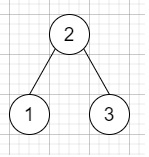
 Data Structure
Data Structure Networking
Networking RDBMS
RDBMS Operating System
Operating System Java
Java MS Excel
MS Excel iOS
iOS HTML
HTML CSS
CSS Android
Android Python
Python C Programming
C Programming C++
C++ C#
C# MongoDB
MongoDB MySQL
MySQL Javascript
Javascript PHP
PHP
- Selected Reading
- UPSC IAS Exams Notes
- Developer's Best Practices
- Questions and Answers
- Effective Resume Writing
- HR Interview Questions
- Computer Glossary
- Who is Who
Inorder Successor in BST in C++
Suppose we have a binary search tree and a node in it, we have to search the in-order successor of that node in the BST. As we know that the successor of a node p is the node with the smallest key greater than p.val.
So, if the input is like root = [2,1,3], p = 1,

then the output will be 2,
To solve this, we will follow these steps −
Define recursive method inorderSuccessor(), this will take root and p
-
if root null, then −
return null
-
if val of root <= val of p, then −
return inorderSuccessor(right of root , p)
-
Otherwise
option := inorderSuccessor(left of root , p)
return (if option is zero, then root, otherwise option)
Example
Let us see the following implementation to get a better understanding −
#include <bits/stdc++.h>
using namespace std;
class TreeNode{
public:
int val;
TreeNode *left, *right;
TreeNode(int data){
val = data;
left = NULL;
right = NULL;
}
};
class Solution {
public:
TreeNode* inorderSuccessor(TreeNode* root, TreeNode* p) {
if(!root) return NULL;
if(root->val <= p->val){
return inorderSuccessor(root->right, p);
}
else{
TreeNode* option = inorderSuccessor(root->left, p);
return !option ? root : option;
}
}
};
main(){
TreeNode *root = new TreeNode(2);
root->left = new TreeNode(1);
root->right = new TreeNode(3);
TreeNode *p = root->left;
Solution ob;
cout << (ob.inorderSuccessor(root, p))->val;
}
Input
{2,1,3},1
Output
2

Advertisements
